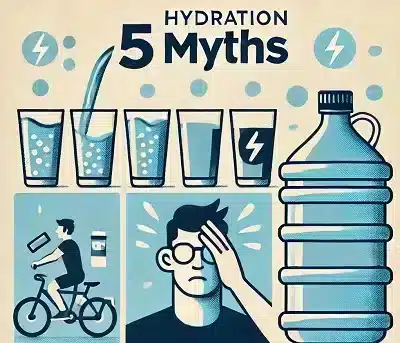Hydration is crucial for maintaining overall health and well-being, but with so much information out there, it’s easy to get confused about what’s true and what’s not. Myths about hydration can lead to misconceptions and sometimes even counterproductive habits. Let’s debunk some common hydration myths and set the record straight on how to stay properly hydrated.
Hydration Myth 1: You Need to Drink Eight Glasses of Water a Day
One of the most pervasive hydration myths is the “8×8 rule”—the idea that you need to drink eight 8-ounce glasses of water a day. While it’s a simple guideline, it’s not a one-size-fits-all rule. The amount of water each person needs can vary based on factors such as age, weight, activity level, and climate.
The Institute of Medicine recommends a total daily water intake of about 3.7 liters (about 13 cups) for men and 2.7 liters (about 9 cups) for women, including water from all beverages and foods. Remember, many foods, especially fruits and vegetables, contain water and contribute to your overall hydration.
Myth 2: Thirst is a Reliable Indicator of Dehydration
Some people believe that as long as you’re not feeling thirsty, you’re adequately hydrated. However, thirst is not always the best indicator of hydration status. By the time you feel thirsty, your body may already be mildly dehydrated, particularly if you’re older, as the sense of thirst diminishes with age.
A better way to monitor hydration is to pay attention to the color of your urine. Pale yellow urine typically indicates proper hydration, while dark yellow or amber-colored urine can be a sign that you need to drink more fluids.
Hydration Myth 3: Caffeinated Beverages Dehydrate You
There’s a common belief that caffeinated drinks like coffee and tea dehydrate the body. While caffeine is a mild diuretic (meaning it can increase urine production), the hydrating effects of the water in these beverages outweigh the diuretic effect. In other words, coffee and tea still contribute to your daily fluid intake.
However, moderation is key. Consuming large amounts of caffeine can lead to increased urination and potential fluid loss, so it’s best to enjoy these beverages as part of a balanced diet while still prioritizing water and other hydrating drinks.
Myth 4: You Can’t Drink Too Much Water
While dehydration is a common concern, it’s also possible to drink too much water, a condition known as water intoxication or hyponatremia. This occurs when an excessive intake of water dilutes the sodium levels in your blood, leading to potentially dangerous health issues like swelling of the brain.
It’s important to listen to your body and drink according to your thirst and needs. For most people, drinking water throughout the day and being mindful of signs of both dehydration and overhydration is sufficient for maintaining a healthy balance.
Myth 5: Sports Drinks Are Necessary for Hydration
Sports drinks are often marketed as essential for hydration, especially during exercise. While they can be beneficial for athletes engaged in prolonged, intense physical activity, most people don’t need the added sugars and electrolytes found in these drinks.
For everyday hydration and moderate exercise, water is usually sufficient. If you’re looking for an extra boost of flavor or electrolytes, natural water enhancers with ingredients like lemon, lime, or a pinch of salt can be a healthier alternative without the added sugars and artificial ingredients.
Staying properly hydrated is essential for health, but it’s important to separate fact from fiction when it comes to hydration advice. Remember, there’s no universal rule for how much water you should drink daily, and your needs can vary based on a range of factors. Listen to your body, monitor signs of hydration, and choose beverages that support your overall well-being. By debunking these common myths, you can develop a more informed and effective hydration routine that keeps you feeling your best.

